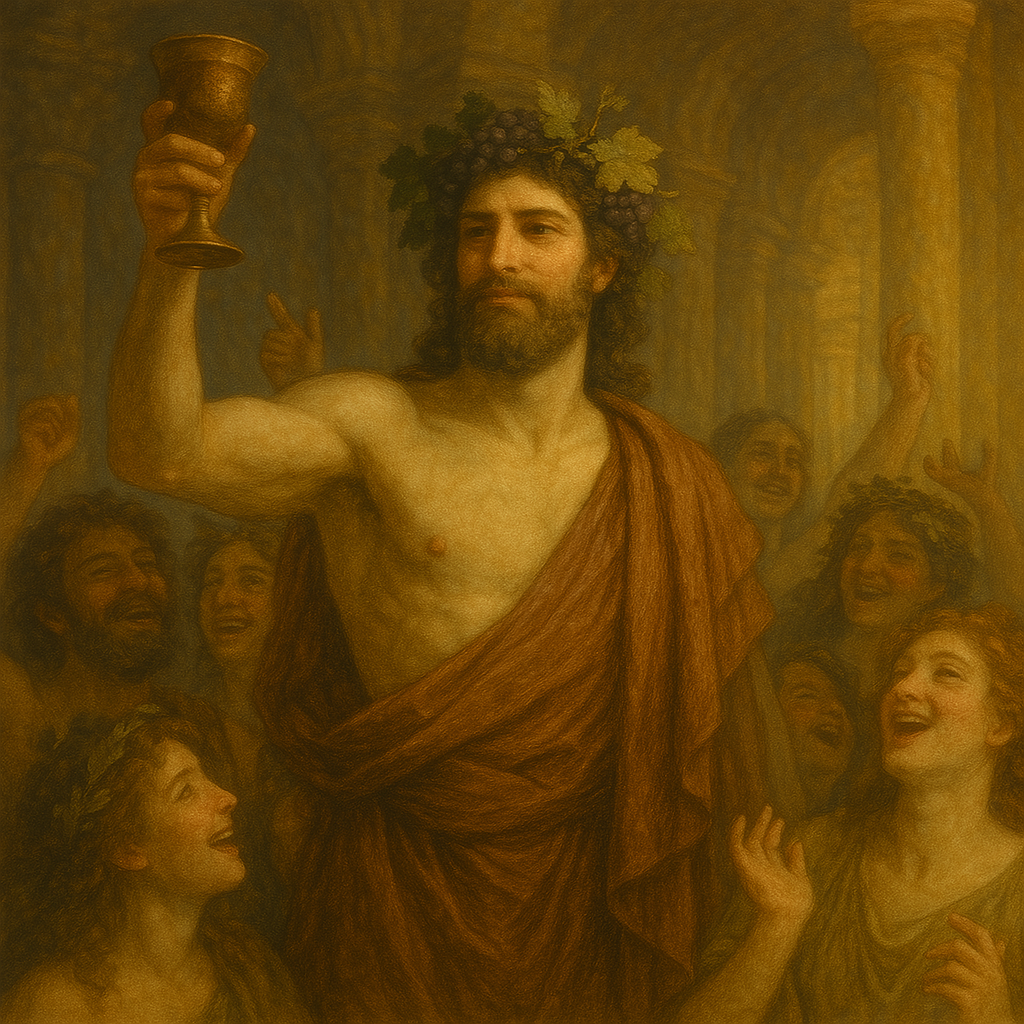Overview
Dionysus is the ancient Greek god of wine, ecstasy, theater, fertility, transformation, and divine madness. As both a liberator and a disruptor, Dionysus represents the powerful forces of emotional release, altered states, and connection to the wild, primal self. He dissolves boundaries—between gods and mortals, self and other, sanity and madness—inviting a return to nature, intuition, and uninhibited expression. His Roman counterpart is Bacchus, and his cult was one of the most mysterious and widely celebrated in the ancient world.
Origins and Mythological Role
Dionysus is the son of Zeus and either Semele (a mortal princess of Thebes) or Persephone, depending on the myth. In one version, Semele is tricked by Hera into requesting to see Zeus in his true form; when he reveals himself, his divine radiance consumes her. Zeus rescues the unborn Dionysus and sews him into his thigh until birth, making Dionysus the only Olympian god to be twice-born.
As a result, Dionysus is associated with rebirth, transformation, and the union of mortal and divine. He traverses worlds—Olympus, earth, the underworld—bridging life, death, and spiritual transcendence.
Symbols and Iconography
Dionysus is depicted as both youthful and androgynous, exuding an air of mystery, allure, and spiritual intoxication.
Common Symbols
- Grapevine & Wine Cup – Representing intoxication, communion, and fertility
- Thyrsus – A pinecone-tipped staff wrapped in ivy or vine, symbolizing divine power and ecstasy
- Leopard or Panther – His sacred animals, embodying untamed instinct and sensuality
- Ivy & Laurel – Evergreen symbols of immortality and nature’s persistence
- Mask & Theater – Signifying his patronage of drama, ritual performance, and identity dissolution
He is often shown:
- Surrounded by Maenads (frenzied female followers) and Satyrs (wild half-goat beings)
- Wearing a crown of ivy, robes of flowing silk, or nothing at all, emphasizing freedom and naturalness
Attributes and Powers
1. God of Wine and Liberation
Dionysus is the god who brings wine as a gift to humanity, not only for pleasure, but as a sacrament of release and transcendence. His wine dissolves inhibitions and societal constraints, allowing deeper truths to surface.
2. Patron of Ecstasy and Divine Madness
Through music, dance, and altered states, Dionysus invites mortals to experience ekstasis—stepping outside oneself to connect with the divine. He blurs the line between madness and enlightenment, encouraging inner liberation.
3. God of Theater and Masks
As the patron of the dramatic arts, Dionysus governs ritual performance, storytelling, and the transformation of identity. In wearing the mask, one becomes another—revealing hidden dimensions of truth and soul.
4. Embodiment of Fertility and Nature’s Vitality
Dionysus’s energy surges through vineyards, forests, and bodies, invoking growth, sensuality, and the resurgence of life after death. His rites celebrate the life-death-rebirth cycle of nature and consciousness.
5. Bridge Between Worlds
Unlike most Olympians, Dionysus travels freely between realms—Olympus, Earth, and the Underworld. He is a psychopompic figure, guiding souls through transformation, grief, and spiritual rebirth.
Key Myths and Stories
The Twice-Born God
After the death of his mother, Dionysus is sewn into Zeus’s thigh and reborn. This myth emphasizes themes of death, gestation, and resurrection, placing Dionysus at the center of transformational power.
Pentheus and the Bacchae
In Euripides’ tragedy The Bacchae, the Theban king Pentheus refuses to honor Dionysus and seeks to suppress his ecstatic rites. Disguised, Dionysus lures him into the forest, where Pentheus is torn apart by his own mother, under divine madness. The story warns of the dangers of denying the irrational and wild within.
Ariadne and Dionysus
After being abandoned by Theseus, Ariadne is rescued and married by Dionysus. Their union symbolizes the healing and renewal found through surrender, grief, and divine love.
Temples and Worship
Mystery Cults and Festivals
- The Dionysian Mysteries were secretive spiritual rites that involved intoxication, ritual performance, music, and dance to invoke ecstatic union with the god.
- Initiates often underwent deep psychological and spiritual transformation, emerging renewed.
Major Festivals
- The Dionysia (City Dionysia) – A grand celebration in Athens featuring theatrical performances, choral odes, and processions
- The Bacchanalia – Roman festivals held in Dionysus’s (Bacchus’s) honor, known for their wild, ecstatic rituals—eventually banned due to their intense fervor
- Anthesteria – Celebrating the opening of the new wine and communion with the spirits of the dead
Sacred Sites
- Mount Parnassus and Delphi – Linked to his oracular and chthonic aspects
- Thebes and Naxos – Prominent centers of worship and mythic events
Spiritual and Archetypal Significance
In modern esoteric and archetypal psychology, Dionysus represents:
- The Ecstatic Archetype – Liberation, surrender, altered states, and divine madness
- The Sacred Rebel – Disrupting rigid systems, inviting authenticity, spontaneity, and emotional truth
- Shadow Integration – Bringing repressed aspects of self into light through catharsis and ritual
- Creative Genius and Performance – Inspiration, dramatic expression, and archetypal embodiment
- Cycle of Death and Rebirth – As a guide through spiritual crises, grief, and transformation
He is often invoked for:
- Emotional release and healing through art, music, and movement
- Breaking through repression and embracing joy, freedom, and embodiment
- Deep spiritual transformation, especially through liminal or altered states
- Creative inspiration, intuition, and divine communion
Conclusion
Dionysus is the divine force of ecstasy, transformation, and emotional truth—the god who invites us to release, feel, and become fully alive. Whether in celebration, grief, performance, or ritual, Dionysus teaches that liberation comes not through control, but through surrender to the deeper rhythms of life. As a guide through madness, creativity, and rebirth, he remains one of mythology’s most compelling and timeless symbols of spiritual freedom, primal joy, and the divine power of the soul unchained.

